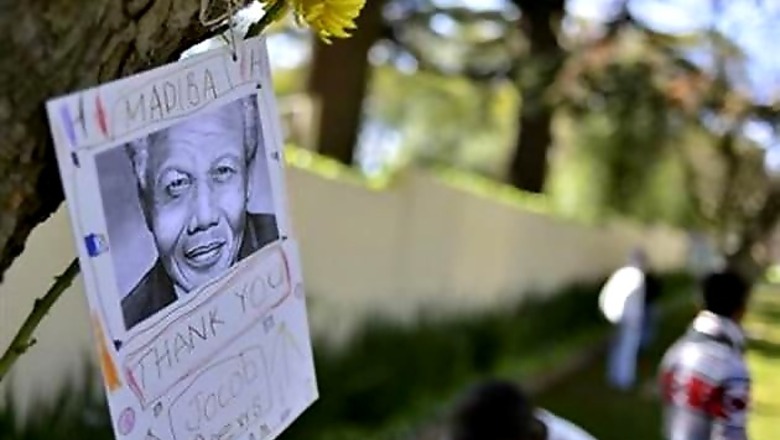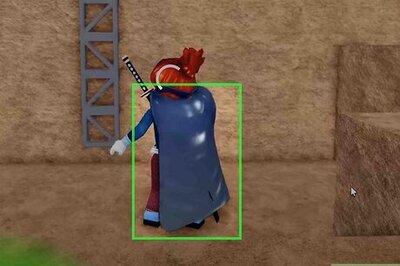
views
Former South African President Nelson Mandela is still clinging to life, his eldest daughter Makaziwe said on Thursday, but she blasted foreign media "vultures" for violating his privacy as he lay critically ill in hospital.
Makaziwe's outburst came after the government reported another downturn in the condition of the 94-year-old anti-apartheid hero, who is admired across the world as a symbol of resistance against injustice and of reconciliation.
A deterioration in Mandela's status after 20 days of treatment for a lung infection forced South African President Jacob Zuma to cancel his participation in a regional summit in neighbouring Mozambique on Thursday.
"I won't lie, it doesn't look good. But as I say, if we speak to him, he responds and tries to open his eyes. He's still there. He might be waning off, but he's still there," Makaziwe told state broadcaster SABC after visiting her father at the hospital in Pretoria where he is being treated.
Accompanied by a group of grandchildren, she angrily criticised the "bad taste" of foreign media she said were intruding on the privacy of Mandela and his family at this difficult time.
"There's sort of a racist element with many of the foreign media, where they just cross boundaries," she said, after running the gauntlet of the pack of camera crews and reporters gathered outside the hospital.
"It's truly like vultures waiting when the lion has devoured the buffalo, waiting there for the last of the carcass. That's the image we have as a family," Makaziwe added.
Her criticism followed several sharp rebukes from Zuma's spokesman against some foreign media reports that have given alarming details of Mandela's deteriorating condition.
Spokesman Mac Maharaj declined to comment on the latest report by a major U.S. TV news network that South Africa's first black president was on life support. He said this was part of Mandela's confidential relationship with his doctors.
Daughter Makaziwe said: "If people say they really care about Nelson Mandela, then they should respect that. They should respect that there is a part of him that has to be respected."
She compared the massive media attention on Mandela, who has been in and out of hospital in the last few months with a recurring lung infection, with the coverage of the death in April of former British prime minister Margaret Thatcher.
"We don't mind the interest but I just feel it has gone overboard. When Margaret Thatcher was sick in hospital, I didn't see this kind of media frenzy around Margaret Thatcher," she said. "It is only God who knows when the time to go is."
OBAMA VISIT IS STILL ON
Mandela's fourth hospitalisation in six months has forced a growing realisation among South Africans that the man regarded as the father of their post-apartheid "Rainbow Nation" will not be among them for ever.
"Mandela is very old and at that age, life is not good. I just pray that God takes him this time. He must go. He must rest," said Ida Mashego, a 60-year-old office cleaner in Johannesburg's Sandton financial district.
U.S. President Barack Obama, who is due to visit South Africa this weekend, said his thoughts and prayers were with the Mandela family and South Africans.
Speaking in Senegal, his first stop on a three-nation Africa tour, Obama said that if Mandela dies, his legacy will live on for ages. He confirmed he still planned to travel to South Africa in the coming days, in response to speculation he might re-schedule his trip because of Mandela's deteriorating health.
Mandela is revered for his lifetime of opposition to the system of race-based apartheid rule imposed by the white minority government that sentenced him to 27 years in jail, more than half of them on notorious Robben Island.
He is also respected for the way he preached reconciliation after the 1994 transition to multi-racial democracy following three centuries of white domination.
Well-wishers' messages, bouquets and stuffed animals have piled up outside Mandela's Johannesburg home and the wall of the hospital compound where he is being treated in the capital.
South Africans seemed resigned to the prospect of losing their hero, but expressed gratitude for what he had done.
"That great man who is in God's hands now fought so a black woman like me could move into this whites-only area in 1991," teacher Nthabi Chauke, 54, said outside the hospital. "Now I know what freedom feels like. I came here to say thank you."
Mandela stepped down in 1999 after one five-year term in office. Since then he has played little role in public life, dividing his time in retirement between his home in the wealthy Johannesburg suburb of Houghton and Qunu, the village in the impoverished Eastern Cape province where he was born.




















Comments
0 comment